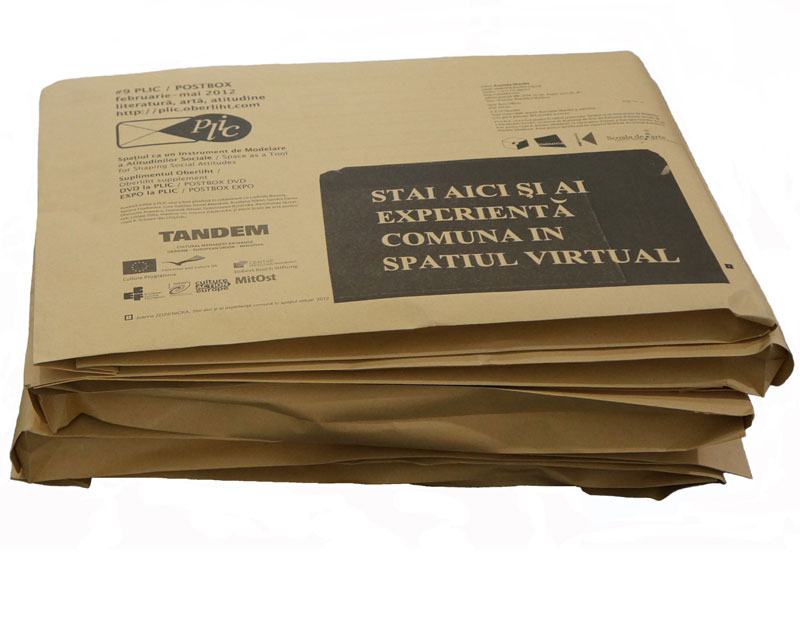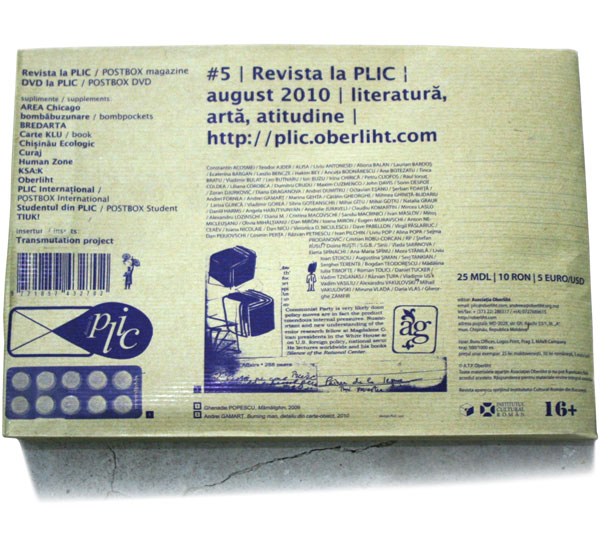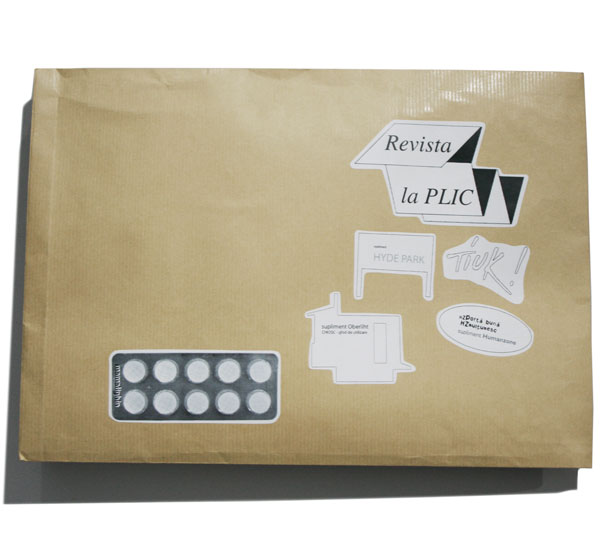– – – scroll down for English – – –
RO
– – – – –
miercuri, 28 martie 2012, ora 16:00
Academia de Muzică, Teatru și Arte Plastice (blocul 3),
atelierul 101
str. 31 August 1989, nr. 137, Chișinău
– introducere de Ștefan RUSU, curator
– proiecția #3 DVD la PLIC: TRANZIȚIA
Pe data de 28 martie 2012, ora 16:00 va avea loc proiecția #3 DVD la PLIC în prezența curatorului Ștefan RUSU. Vor fi proiectate lucrările artiștilor: Andreea CÂRNU [RO], Igor SCERBINA [MD/RU], Tatiana FIODOROVA [MD], Mark VERLAN [MD], Ghenadie POPESCU [MD].
Perioada de tranziție, ce a caracterizat trecerea de la un regim de tip socialist la cel capitalist în țările postcomuniste, s-a încheiat cu consolidarea unui regim democratic și a unor economii stabile și funcționale (ex. Polonia, Ungaria, Cehia, Slovenia
etc.), însă o parte din țările fostului bloc socialist, cum a fost cazul țărilor baltice, au avut, de-a lungul anilor ‘90, un parcurs ceva mai dificil, dar s-au integrat rapid în Comunitatea Europeană; altele, cum au fost România și Bulgaria, au mai stat la ușă, dar au prins, și acestea, ultimul val de integrare, în 2007.
Spre deosebire de cele baltice, o bună parte din tările balcanice, printre care Macedonia si Croația, bat pasul pe loc, ca efect al unor dispute cu vecinii lor apropiați din UE, Grecia și Slovenia, iar Serbia încearcă să depășescă sechelele produse atât în regiune, cât și pe plan extern, de regimul Milosevici.
În acest context, Moldova pare că și-a asumat pe deplin statutul de tară în tranziție eternă, care a regresat treptat în timp și spațiu, reușind să-și consolideze un regim autocratic și o stagnare eminentă în ambele registre, politic și economic.
Mai mult decât atât, odată cu integrarea României și Bulgariei, Moldova s-a pomenit pe dinafara frontierei UE, adică pe linia de demarcație trasată de sferele de interes geopolitic ale fostului „imperiu sovietic”, reiterate astăzi de Rusia, care a mostenit și teritoriile fostului URSS și influența asupra zonelor de interes în regiune, reactualizând situația de dinainte de ‘89.
Lucrările din prezenta compilație reflectă, în mare măsură, tendințele acestei perioade, filtrate de imaginația artiștilor care au reflectat pe marginea noțiunii de tranziție și a efectelor acesteia asupra societății.
Ștefan RUSU (2010)
Un sinopsis despre lucrările proiectate găsiți în Catalogul PLIC
Conținutul întregului număr poate fi consultat aici: https://plic09.wordpress.com/arhiva-2/3-mai-2010/
Seria de proiecții video a DVD la PLIC are drept scop promovarea noilor medii (new media) în rîndul studenților și tinerilor artiști care își fac studiile în cadrul unor instituții de tip academic. Totodată proiecțiile servesc drept cadru de discuție în jurul practicilor de artă contemporană.
Următoarele proiectii vor avea loc la AMTAP conform următorului grafic:
3 aprilie 2012 – #4 DVD la PLIC: GENUL ZERO, curator Sanda WATT [RO]
10 aprilie 2012 – #5 DVD la PLIC: EXPLORAREA ARHIVELOR, curator Ștefan RUSU [MD]
17 aprilie 2012 – #6-7 DVD la PLIC: SCENE / PROTAGONIȘTI / SIMPTOME, spații în schimbare, curator Natasa BODROZIC [HR]
Revista la PLIC – literatură, artă, atitudine este o publicație cu caracter interdisciplinar și experimental pronunțat, care își propune să reflecte tendințele artistice și literare ale tinerilor creatori: https://plic09.wordpress.com/prezentare/
EN
– – – – –
Wednesday, 28th of March 2012, 4 p.m.
Academy of Music, Theatre and Fine Arts in Chisinau (3rd block),
studio 101
str. 31 August 1989, nr. 137, Chișinău
– introduction by Steafan RUSU
– screening of #3 POSTBOX DVD: TRANSITION
On March 28, 2012, 4 pm will take place the screening of #3 POSTBOX DVD in the presence of Stefan RUSU who curated it. The works of Andreea CARNU [RO], Igor SCERBINA [MD/RU], Tatiana FIODOROVA [MD], Mark VERLAN [MD] and Ghenadie POPESCU [MD] will be screened.
The transition period is defined in post-communist countries by shift from socialist to capitalist was completed in the strengthening of the democratic system and the stable and functional economy (e.g. Poland, Hungary, The Czech Republic, Slovenia, etc.). Some of the countries in the former communist bloc, such as the Baltic countries went through a more difficult process in the ’90 and were nevertheless quickly integrated into the European Community, others, such as Romania and Bulgaria had to stand in line for longer, but they were eventually included in the last integration wave in 2007. Unlike the Baltic states, most countries in the Balkans, among which Macedonia and Croatia, are marking time as a result of the disputes with their close EU neighbours – Greece and Slovenia, while Serbia is still struggling to overcome the after-effects that the Milosevic regime caused both locally and to foreign affairs.
In this context, Moldova seems to have fully undertaken the status of a country in eternal transition, which moved back in time and space, managing to consolidate an autocratic regime and a prevailing abeyance in both fields: political and economic. Furthermore, after the accession of Romania and Bulgaria, Moldova ended up just outside the EU border, that is to say the delimitation line drew by the geopolitical interest spheres of the former Soviet empire, reiterated today by a Russia who inherited both the territories of the former USSR and the influence on the interest areas in the region, thus bringing back the situation before 1989.
The works in this anthology reflect to a large extent the tendencies of this period, filtered by imagination of the artists considering the notion of transition and its impact on society.
Stefan RUSU (2010)
In POSTBOX catalogue you can find a synopsis for the screened works.
The entire content of this issue is available here: https://plic09.wordpress.com/arhiva-2/3-mai-2010/
The series of screenings of POSTBOX DVD has as objective to promote the new media among the students and young artists studying in the academic milieu. It also serves as a frame for discussions about contemporary art practices.
The next screenings are scheduled to take place at the Academy of Art:
April 3, 2012 – #4 POSTBOX DVD: GENDER ZERO, curator Sanda WATT [RO]
April 10, 2012 – #5 POSTBOX DVD: HAUNTING THE ARCHIVES, curator Ștefan RUSU [MD]
April 17, 2012 – #6-7 POSTBOX DVD: SCENES / PROTAGONISTS / SYMPTOMS, spaces in the speed of change, curator Natasa BODROZIC [HR]
The POSTBOX magazine is an interdisciplinary and experimental publication that aims to reflect the young artists’ and writers’ work and activity: https://plic09.wordpress.com/prezentare/
















Lasă un comentariu